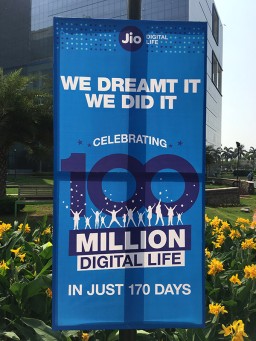100 mn new customers in 170 days – Reliance Jio in India is the fastest growing mobile operator in the world
Dr. Steffen Roehn supports Reliance Jio with designing and building the IT-platform and mobile app ecosystem for the Indian Market at a leading position as advisor within Technology (please refer also to reference Reliance Jio)
Mumbai. On February, 21st, Reliance Limited’s chairman Mukesh Ambani announced a major milestone: More than 100 million customers in 170 days have chosen our Jio 4G services – this is an astonishing record even for a large market like India. Many press reports have highlighted all the relevant facts, but two things stick out to me (January 2017):

- More than 31 PB of data usage per day on our network, which makes Jio’s customers use almost as much as all US mobile data users and 50% more than China’s mobile users. And this just about half a year into service.
- With the help of Jio, India is now the number 1 in mobile data usage in the world – prior to this India took position 159!
How did we do it?
Many things at Jio had to fall into place to make this happen: Obviously building a state-of-the-art 4G network, which not many companies have done from scratch, certainly none at our scale. Also, laying the infrastructure foundation for an “all-over-the-country” coverage with fiber is a massive undertaking. Not to forget, building up a supply and distribution chain to reach out to more than 1.2bn Indian citizens. Above all, a great team work effort amongst many different functions and a very different way of doing things agile and fast with the latest technologies has been the recipe for success.
Radically different on-boarding experience
Now, let’s look on how we build the automation and systems part of the Jio story. We start with one of our major cornerstones of success, our On-boarding platform: adding more than 1 million customers per day and providing a “walk-out-working” on-boarding experience. How was this achieved?
India’s on-boarding practice prior to Jio: Customer’s nightmare
For those, who have not yet bought a SIM card in India, here is the existing process to on-board customers prior to Jio: You had to provide photocopies of your Proof of Identity (PoI, e.g. passport) and Proof of Address (PoA, e.g. electrical power bill), sign both of those, fill out a Customer acquisition form (CAF) on paper and sign this as well. Then, the retailer needs to sign and the whole paper package goes to the operator. There, a dedicated officer testifies with his signature, that the data in CAF/PoI/PoA is identical to the data in the CRM system. Only after this signature the customer is asked to “tele-verify”, i.e. call from his new SIM card to a dedicated number and again authorize himself. After this last final step, his SIM card gets activated. This process – despite many optimizations – takes many hours, up to 48h. Customer’s nightmare!
eKYC on-boarding with Jio: Activation within 15 minutes
At Jio we have leveraged the Indian digital identity “Aadhar”, to which more than 1 bn Indian citizens have signed up for. With Aadhar comes a set of API’s from the government, which allows to authorize individuals just by their Aadhar card and their fingerprint. So, we wanted to leverage that great digital enabler for our customer on-boarding and turn customer’s nightmare into customer’s delight: We have built a corresponding app (incl. backend processes) for the retailers and demonstrated it to the regulation authorities. They approved this new process, which is essentially more precise, secure and customer-friendly compared to the existing one. The approval came a couple of weeks prior to our launch in September 2016. With our agile delivery, we implemented and stabilized the new eKYC process (“electronic Know Your Customer”) in record time of three weeks. Our customers were amazed: On-boarding now happens with only one fingerprint, no tele-verification call and activation takes around 5-15 minutes. We are not only delighting customers, we also have disrupted the Indian telco market.
© Roehn Management Consulting GmbH
